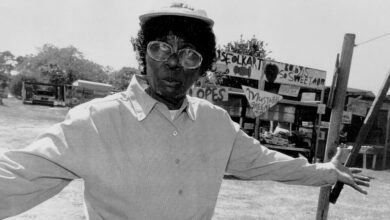As Truck Protest Spreads, Canada’s Capital Braces for More Demonstrations

OTTAWA — A protest in Ottawa last week led by truckers against pandemic measures in Canada that has paralyzed the country’s capital since then was expected to expand on Saturday with the arrival of hundreds more trucks. Police and officials in Toronto, Canada’s largest city, and Quebec City, that province’s capital, braced for similar demonstrations.
What began as a convoy of trucks and cars that set out from the province of British Columbia to protest a vaccine mandate for cross-border truckers has grown into a general protest against pandemic restrictions and a range of other political causes, including opposition to Prime Minister Justin Trudeau.
The police anticipate that 1,000 to 2,000 protesters will gather on Saturday in Ottawa, along with 300 to 400 trucks.
Workmen were blocking some major roads downtown with concrete barriers on Friday as part of a new “surge and contain strategy” that Chief Peter Sloly of the Ottawa Police announced. “The surge will deliver a clear message to the demonstrators: The lawlessness must end,” he said. “Our goal is to end the demonstrations.”
While there have been no serious injuries or uncontrolled violence associated with the demonstrations, they have nevertheless paralyzed Ottawa’s downtown core with traffic, noise and complaints of harassment.
“I’m receiving hundreds — and I’m not exaggerating — hundreds of emails telling me: ‘I went out to get groceries, I got yelled at, I got harassed. I got followed down the street, I’m so afraid that I can’t go out,’” Catherine McKenney, the city councilor for the area, said Thursday afternoon.
Throughout the area, many businesses have been closed for the past week, resulting in tens of millions of dollars in lost sales. Those that have remained opened have struggled to enforce provincial mask rules.
About 200 to 250 trucks remained downtown from last Saturday’s demonstration, and supporters have been delivering diesel fuel to the truckers, who have stacked firewood in parks and built a small wooden canteen building next to a canal that serves as a popular skating rink in the winter.
Many in Ottawa have turned their frustrations on the city’s police for not aggressively shutting down the protests. Chief Sloly, who initially had declared his force’s work a “success,” on Friday acknowledged the growing frustration with his department’s approach.
“I understand there is a wide range of opinions around the efficacy of our efforts to date, but we have done absolutely the best we can to keep this city safe,” he told a news conference. “We need to do better, we’re committed to doing better.”
Chief Sloly said that heavy machinery would be used to close streets and expressway offramps into the city center, and that all five bridges across the Ottawa River to Quebec might be closed.
In Toronto, protesters plan to gather at shopping malls before converging on the Ontario provincial legislature, which is in a downtown area that is also home to several major hospitals. On Friday morning, Toronto Police blocked off parts of the area with buses and barricades.
Chief James Ramer of the Toronto Police said at a news conference that the police would not allow protest vehicles to park around the legislature and warned that anyone attempting to interfere with access to hospitals or emergency services “will be subject to strict enforcement.”
The first protest trucks began arriving in Quebec City from other parts of the province on Friday. Protesters found that several streets were already closed for the city’s Winter Carnaval, a major tourist event that also began Friday.
There were only five heavy trucks parked near the provincial legislation on Friday afternoon, as several pick up trucks carrying Canadian and Quebec flags circulated in the vicinity.
At a nearby parking lot, the police were in discussion with protesters in about a dozen pickup trucks. The protesters said they had already been removed from four other parking lots by police officers and that the police were making it difficult them to open their large canteen trailer so they could warm up and eat.
Bruno Marchand, the city’s mayor, said that he had confidence in the ability of police to keep order, noting that the city deals with 100 protests a year.
“If they have a cause they have to do it respectfully. This is the only way to be listened to and understood,” he told reporters. “Otherwise, police officers will have to do their jobs.”
Ian Austen reported from Ottawa, and Vjosa Isai from Toronto. Peter Black contributed reporting from Quebec City.





